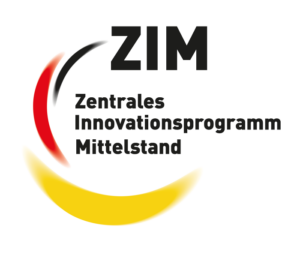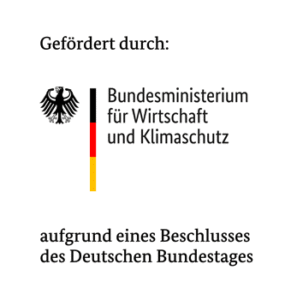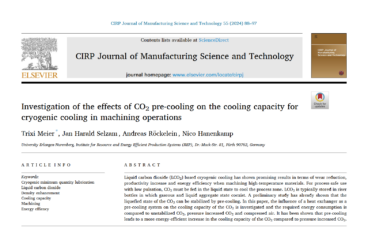Wir freuen uns, die Veröffentlichung unserer neuesten Forschungsergebnisse im CIRP Journal of Manufacturing Science and Technology bekanntzugeben. In der Arbeit mit dem Titel „Investigation of the effects of CO2 pre-cooling on the cooling capacity for cryogenic cooling in machining operations“ untersuchen Trixi Meier, Jan Harald Selzam, Andreas Röckelein und Nico Hanenkamp die Auswirkungen einer CO2-Vorkühlung auf die Kühlkapazität bei kryogenen Kühlverfahren während der Zerspanung.
Der Artikel ist verfügbar unter: ➡https://www.sciencedirect.com/science/article/pii/S1755581724001445
Abstract:
Liquid carbon dioxide (LCO2) based cryogenic cooling has shown promising results in terms of wear reduction, productivity increase and energy efficiency when machining high-temperature materials. For process-safe use with low pulsation, CO2 must be fed in the liquid state to cool the process zone. LCO2 is typically stored in riser bottles in which gaseous and liquid aggregate state coexist. A preliminary study has already shown that the liquefied state of the CO2 can be stabilized by pre-cooling. In this paper, the influence of a heat exchanger as a pre-cooling system on the cooling capacity of the CO2 is investigated and the required energy consumption is compared to unstabilized CO2, pressure increased CO2 and compressed air. It has been shown that pre-cooling leads to a more energy-efficient increase in the cooling capacity of the CO2 compared to pressure increased CO2.
Keywords: Cryogenic minimum quantity lubrication; Liquid carbon dioxide; Density enhancement; Cooling capacity; Machining; Energy effiency
Diese Forschung wurde teilweise im Rahmen des Teilprojekts KK5059915KP3 des Verbundforschungsprojekts „coolFlex4sustainability“ durchgeführt. Dieses Projekt wird vom Bundesministerium für Wirtschaft und Klimaschutz (BMWK) aufgrund eines Beschlusses des Deutschen Bundestages gefördert. Das Projektkonsortium besteht aus dem Lehrstuhl für Ressourcen- und Energieeffiziente Produktionsmaschinen und den Unternehmen SN-Spindeltechnik und Kudernak GmbH Kunststoff- & Dichtungstechnik.


Trixi Meier, M. Sc.
Department Maschinenbau (MB)
Lehrstuhl für Ressourcen- und Energieeffiziente Produktionsmaschinen (REP, Prof. Hanenkamp)
- Telefon: +49 911 6507864892
- E-Mail: trixi.meier@fau.de


